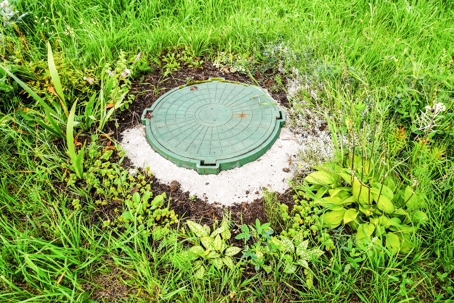Table of Contents
- What's the Difference Between Septic and Sewer?
- Septic vs. Sewer Maintenance: Who's Responsible for What?
- Which Is More Expensive?
- Converting from Septic to Sewer
- Septic and Sewer Impact on Home Value and Resale
- What Really Matters When Choosing
Whether you're house hunting, just moved to a home with a septic system, or simply curious about how these systems work, you've probably wondered: What's the real difference between septic tanks and city sewer?
Maybe you've heard conflicting stories or aren't sure which system you'd prefer.
Here's the truth—both septic systems and city sewers can work beautifully when properly maintained. At Wind River Environmental, we've helped thousands of homeowners navigate these decisions across the East Coast, and we're here to give you the facts.
This guide will break down the fundamental differences in cost, maintenance, and long-term considerations so you can make the best choice for your situation.
What's the Difference Between Septic and Sewer?
The choice between septic and sewer isn't just about pipes; it's about two completely different approaches to wastewater management.
Let's start with the basics of how each system works:
How Septic Tanks Work
Septic systems handle all your wastewater right on your property.
When you flush, shower, or do laundry, the water flows to an underground septic tank where solids settle to the bottom and oils float to the top. The middle layer of clarified water then moves to a drain field where soil naturally filters it clean.
This self-contained system works 24/7 without any input from municipal services. It's essentially a mini wastewater treatment plant in your backyard, relying on natural processes and beneficial bacteria to break down waste and protect groundwater.
How Sewer Systems Work
City sewer systems transport your wastewater through underground pipes to a centralized municipal treatment facility.
Your home connects to increasingly larger pipes that eventually reach the treatment plant, where professional operators use advanced technology to clean millions of gallons daily.
Once treated, clean water is safely returned to local waterways. The entire process is managed by municipal utilities, meaning homeowners simply flush and forget—the city handles everything downstream from their property line.
Septic vs. Sewer Maintenance: Who's Responsible for What?
This is where the two systems differ dramatically. With septic, you're the utility company; with sewer, the city handles most of the heavy lifting.
Septic System Maintenance
Homeowners handle everything: pumping every 2-3 years, annual inspections, and being mindful of what goes down drains.
You'll also need to protect the drain field from heavy vehicles and monitor for warning signs like slow drains or odors. This hands-on approach requires diligence, but gives you complete control over your system's health.
While it might sound overwhelming, septic care and maintenance is actually straightforward once you know the basics.
Explore our septic system guide to see what’s involved in keeping things running smoothly.
City Sewer Maintenance
The city manages the main sewer lines, treatment facilities, and some repairs.
However, homeowners typically remain responsible for the lateral line from their house to the city main (though this varies by jurisdiction). Your main concerns are avoiding clogs in your home's plumbing and ensuring tree roots don't damage your sewer lateral.
What You Can and Can't Put Down the Drain
Both systems hate fats, oils, grease (aka FOG), chemicals, and non-biodegradable items—these rules aren't negotiable.
Septic systems are more sensitive to antibacterial products, excessive water usage, and anything that kills beneficial bacteria. Sewer systems can handle slightly more abuse, but sending inappropriate items down the drain (like flushable wipes) can still cause expensive backups and municipal fines.
Rule of thumb: whether your on a septic system or city sewer, only flush toilet paper, human waste, and that's it.
Which Is More Expensive?
Cost often drives the decision when you’re choosing between septic tank and sewer systems, but the answer depends on your timeframe and perspective.
Both systems have hidden expenses that can surprise new homeowners.
Monthly vs. Occasional Costs
Understanding the payment timing can help you choose what works best for your household budget:
- Sewer: Consistent monthly bills ranging from $30 to $80, depending on your location and usage.
- Septic: No monthly fees, but periodic pumping costs $300 to $600 every 2-3 years.
Different payment styles suit various budgets. While some prefer predictable monthly expenses, others like paying only when service is needed.
The 3-Year Cost Breakdown
To make an apples-to-apples comparison, let's look at total costs over a standard septic pumping cycle:
- Sewer: $30 to $80/month × 36 months = $1,080 to $2,880
- Septic: $300 to $600 pumping × 1-2 times = $300 to $1,200
In the short term, septic systems typically cost less, sometimes significantly so.
Long-Term Considerations
Beyond routine costs, both systems can face major repairs that significantly impact your budget:
- Septic: Major repairs, like drain field replacement, can cost $5,000 to $20,000, but they are rare with proper maintenance.
- Sewer: Lateral line repairs range from $1,500 to $6,000, but the city handles main system failures.
The good news? Proper maintenance makes these expensive scenarios much less likely, regardless of which system you choose.
Converting from Septic to Sewer
Some homeowners may have opportunities for septic to sewer conversions when municipalities expand sewer service into previously rural areas.
The process involves connecting your home to the new city main and properly abandoning your septic system.
These programs are increasingly common across the country, with states like California, Florida, and Nevada offering partial or full funding assistance to help offset conversion costs.
Conversion typically costs $3,000-10,000 but eliminates ongoing septic maintenance and can increase property values in some markets.
Companies like Cooke's, part of the Wind River Environmental network, specialize in these septic-to-sewer conversions in Martin County in Florida, handling permits, excavation, and proper septic decommissioning.
Septic and Sewer Impact on Home Value and Resale
Both systems can positively or negatively affect home values depending on their condition and local market preferences.
Well-maintained septic systems rarely hurt resale value, while neglected ones can cost sellers thousands in pre-sale repairs or buyer credits.
The key is maintenance history. Buyers and inspectors look for pumping records, system age, and drain field condition. A 20-year-old septic system with no maintenance records raises red flags, while documented regular care provides confidence.
For real estate professionals, having reliable resources to share with clients facing these decisions is invaluable, so be sure to check out our real estate resources and tools.
What Really Matters When Choosing
Maintenance matters more than the system type itself.
Whether you're choosing between systems, managing an existing septic system, or just understanding your options, proper care is what determines long-term satisfaction and costs.
When maintained correctly, both systems can reliably serve your family for decades, so base your decision on personal preferences like budgeting style, comfort with DIY tasks, andlong-term plans for the property.
Whether you need routine maintenance, emergency repairs, or expert advice on making the switch, find your local Wind River Environmental office to get started with trusted professionals who understand your system inside and out.




